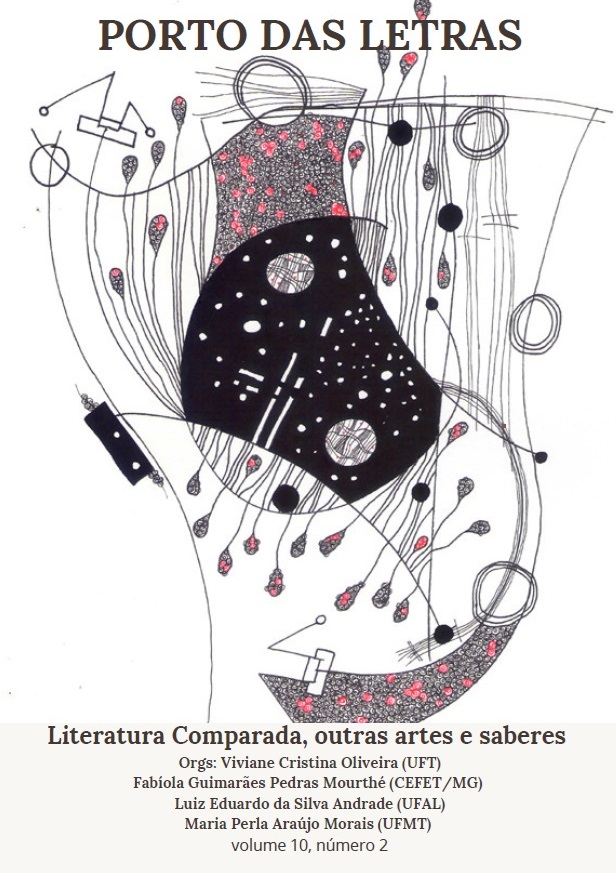A LINHA SERPENTINA DA BELEZA E A IMAGEM DE NARCISO EM THE LINE OF BEAUTY, DE ALAN HOLLINGHURST
DOI:
https://doi.org/10.20873.24212Abstract
In this essay, I aim to discuss the “ogee”, or the “line of beauty”, which gives title to the novel The Line of Beauty (2004), by Alan Hollinghurst. On the one hand, this essay is based on the premise that the “line of beauty” represents a kind of structuring principle of the novel. On the other hand, criticism concerning Hollinghurst’s novel tends to fall into schematic readings, through associative keys of meaning, mainly related to the work of Henry James. Therefore, I deliberately try to avoid such critical considerations that produce a schematic reading key, in order to evade reducing the novel to a series of formal variations of straight and curved lines, and so on. My intent is to build a coherent critical argument based on the novel’s own suggestions about the line of beauty, which values sinuous argumentative lines, full of twists, comings and goings, instead of closed conclusions. In this critical argument, I also focus on the figure of Narcissus and on the manner it acts upon the conceptions, or on the relationships, of beauty that the novel weaves towards Nick.
References
DURAS, Marguerite. Practicalities (1987). Trad. Barbara Bray. Londres: Harper Collins, 1990.
DURING, Simon. Completing secularism: the mundane in the neoliberal era. In: CALHOUN, Craig; J. VAN ANTWERPEN, Jonathan; WARNER, Michael. Varieties of secularism in a secular age. Cambridge, Massachusetts: Harvard University Press, 2010, p. 105-125.
DYER, Geof. Alan Hollinghurst: the line of beauty. In:______. Working the room: essays and reviews – 1999–2010 (2010). Edinburgh: Canongate Books, 2015, p. 216-219.
EASTHAM, Andrew. Inoperative Ironies: Jamesian Aestheticism and Post-modern culture in Alan Hollinghurst’s The Line of Beauty. ______. Aesthetic Afterlives – Irony, Literary Modernity and the Ends of Beauty. Londres: Continuum International Publishing Group, 2011, p. 188–203.
EDEL, Leon (Ed.). 1984. The letters of Henry James, volume 4: 1895–1916. Cambridge, Massachusetts: Harvard University Press, 1994.
EDELMAN, Lee. No future: queer theory and the death drive. Durham: Duke
University Press, 2005.
Hogarth, William. The Analysis of Beauty (1753). Disponível em:
ub.uni-heidelberg.de/artdok/1217/1/Davis_Fontes52.pdf.>. Acesso em março de 2023.
HOLLINGHURST, Alan. The line of beauty. London: Picador, 2004.
JAMES, Henry. The Art of Fiction (1884). In: HOFFMAN, Michael; MURPHY, Patrick. Essentials of the Theory of Fiction. Londres: Duke University Press, 2005, p. 13-20.
KERMODE, Frank. Essays on fiction 1971–1982 (1983). Londres: Routledge, 2015.
ROBERTS, Adam. Ogee: The Line of Beauty. In: MATHURAY, Mark (Ed.). Sex and sensibility in the novels of Alan Hollingurst. Londres: Palgrave Macmillan, 2017.
MOON, Michael. Burn me at the stake always. In: The New England Quarterly, Vol. 78, nº 4, 2005, p. 631–642. Disponível em: <https://www.jstor.org/register?redirectUri=%2Fstable%2F30045584%3Fread-now%3D1%23page_scan_tab_contents>. Acesso em março de 2023.
PHILLIPS, Adam. Promises, promises (2000). London: Faber and Faber, 2002.
Downloads
Published
How to Cite
Issue
Section
License
Os autores concordam com os termos da Declaração de Direito Autoral, que se aplicará a esta submissão caso seja publicada nesta revista (comentários ao editor podem ser incluídos a seguir).

